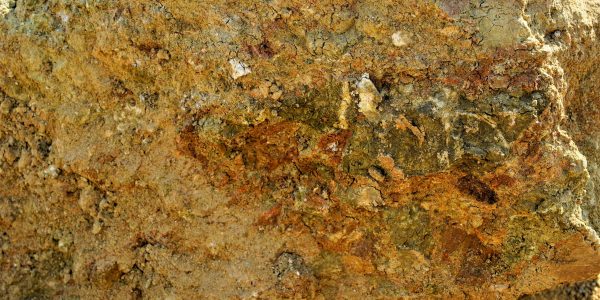BENTONITE
BENTONITE is clay generated frequently from the alteration of volcanic ash, consisting predominantly of smectite minerals, usually Montmorillonite.

Bentonite presents strong colloidal properties and its volume increases several times when coming into contact with water, creating a gelatinous and viscous fluid. The special properties of Bentonite (hydration, swelling, water absorption, viscosity, and thixotropy) make it a valuable material for a wide range of uses and applications.
Bentonite deposits are normally exploited by quarrying. Extracted Bentonite is distinctly solid, even with a moisture content of approximately 30%. The material is initially crushed and, if necessary, activated with the addition of soda ash (Na2CO3). Bentonite is subsequently dried (air and/or forced drying) to reach moisture content of approximately 10- 12%. According to the final application, Bentonite is either sieved (granular form) or milled (into powder and super fine powder form). For special applications, Bentonite is purified by removing the associated gangue minerals, or treated with acids to produce acid-activated Bentonite (bleaching earths), or treated with organics to produce organoclays.
In Sodium Bentonite the exchangeable sodium cations are predominant. In fact, the sodium Bentonite found in KUTCH has high swelling and gelling properties along with good viscosity and liquid limit and high Methelyne Blue Value. The Bentonite found in the Kutch region is of igneous origin. Being formed millions of years ago from the volcanic deposits these sodium Bentonite deposits are darker in color due to rich iron content. Bentonite with calcium ion is abundant but they swell less as compared with sodium Bentonite but they show higher green strength.
Bentonite varies in color from grey to white, yellow, green, blue, black but more often yellow or yellowish green. The weather changes bring about a cellular characteristic like popcorn or a frothy structure around because of swelling and shrinking on wetting and drying.
In India, Gujarat has a large amount of Bentonite deposits. Almost three fourth of the Bentonite deposits are in Kutch districts in Gujarat. The formation of Bentonite here is associated here with the Deccan trap rocks and is also confined to alteration of ash beds. Bentonite mostly occurs in oval shaped bodies 3 to 10m thick covered by a residual layer of 1.5 to 3m. The soil is sticky and gives a frothy feel.
However being a versatile mineral it has a wide range of industrial applications like Drilling fluids for oil, gas, mineral and water exploration, binding agents for foundry and iron ore palletisation operations.
Bentonite Applications
- Foundry Green Sand Moulding
- Oil & Gas Drilling
- Iron Ore Palletisation
- Civil Engineering & Piling
- Animal Feed
- Paper & Pulp
- Cosmetics & Pharmaceuticals
- Cat Litter